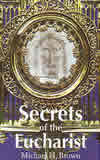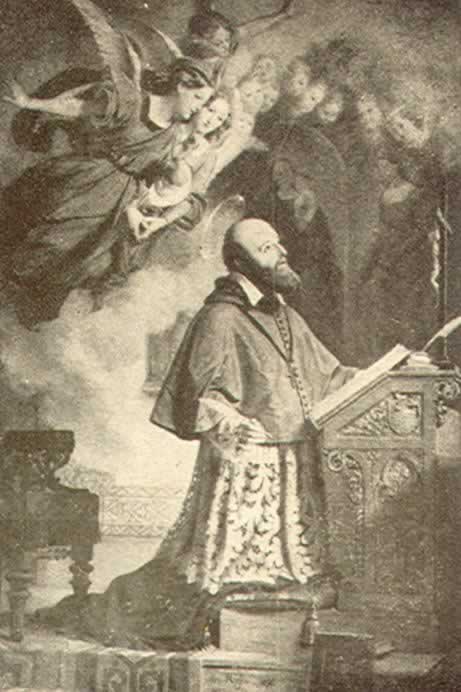|
 Secrets
of the Eucharist
by
Michael
Brown. Heart-felt reflections on the Holy
Eucharist, fresh new insights, and miracles. What did Padre Pio say? How
did saints adore? What's the "real presence"? Full of insights
into the Mass, the most powerful prayer possible. One of our most popular books.
CLICK HERE Secrets
of the Eucharist
by
Michael
Brown. Heart-felt reflections on the Holy
Eucharist, fresh new insights, and miracles. What did Padre Pio say? How
did saints adore? What's the "real presence"? Full of insights
into the Mass, the most powerful prayer possible. One of our most popular books.
CLICK HERE
|
|
|
|
|

__________________________________________________
CONSOLING THOUGHTS ON PURGATORY
CAME FROM SAINT WHO SAW BEYOND SUFFERING

By Susan Tassone
The opinion of St. Francis De Sales
was that the thought of
purgatory
should cause not so much pain as consolation. Those who fear purgatory do so in
consideration of their own interests and self-love, he said, rather than in the interests of God.
No doubt -- as St. Catherine of Genoa told us
-- the torments are so great that
the greatest suffering of this life cannot be compared with them.
But the
interior satisfactions in purgatory are such that no enjoyment or prosperity on earth could equal
it. St. Francis De Sales tells us
why:
"The souls in purgatory are in
a constant state of union with God," the saint taught.
"They are perfectly submissive to His
Holy Will, or their will is
so transformed into the Will of God, that they cannot wish for anything but what
God wishes; in such a way, if paradise were opened to them, they would
rather precipitate themselves into hell than appear before God with the stains
which they still see on themselves [our italics].
"They are purified voluntarily and lovingly, because such is the
Divine
good-pleasure. 'Thou are just, O Lord, and Thy judgment is right.' "They wish to be there in the manner that pleases God, and for as long a
time as He pleases.
"They are impeccable, and cannot have the least motion of impatience, or be
guilty of the smallest imperfection. They love God more than themselves, and more than all things else, with a
perfect, pure, and disinterested love. They are consoled by the angels.
"They are assured of their salvation.
"Their most bitter bitterness is in the most profound peace.
"If purgatory is a kind of hell as regards to pain, it is a kind of paradise
as regards to the sweetness which charity diffuses through the heart -- charity
which is stronger than death, and more powerful than hell, and whose lamps are
fire and flames: A state more desirable than terrible, since its flames are flames of love."
If all these things are so, then why be charitable to the souls in purgatory?
The reason is because the states of these souls are desperately
lonely. Their time of merit ends when the soul leaves the body. If they are in
purgatory, they are unable to help themselves.
The suffering souls rely totally
on us! Our compassion will give them the glory which they will render to God in
Heaven that is delayed.
These two motives should engage
us by our prayers, almsgiving, and all kinds of good works, especially offering
the Holy Sacrifice of the Mass for them to obtain their speedy deliverance!
When St. Francis de Sales’ friends or acquaintances died, he never grew weary
of speaking fondly of them, or recommending them to the prayers of others.
His usual expression:
We do not remember sufficiently our dead, our faithful departed. Indeed, we do not speak enough of
them. We turn away from that conversation as from a sad story when we should be
recalling their needs and lives (at least to ourselves, in prayer). Scripture
assures us that true love is stronger than death.
St. Francis was accustomed to saying that in this single work of mercy we
practice all the corporal works of mercy together when we assist the suffering
souls.
Now more than ever, in these turbulent, prophetic times, offer
the Holy Sacrifice of the Mass for deceased loved ones -- for the hundreds of
thousands who have died in Burma, and Myanmar. Was anyone prepared to die? Was
there time to pray, or offer an act of sorrow for their sins?
Let us show our compassion and
love to these souls. In a special way, remember the children and young adults
who died under the piles of buildings, those who were in hospitals, working, or
tending to their daily walks in life. Remember too the victims of the capsized
ferry in the Philippines.
In response to a question from the bishops on how to address secularism and
other destructive social trends, Pope Benedict XVI suggested that we
teach
people to how to pray.
For us, Church militants here on
earth, prayer is the answer. A Mass for the deceased is the answer.
Pope Benedict nailed it on the
head.
[resources:
Susan Tassone's books; for Masses:
www.spiritualtreasury.org
or your local parish]
[see also:
Midwest Michael H. Brown afterlife retreat, announced for
Cincinnati, Sept. 20
E-mail this
link directly

Return to home page www.spiritdaily.com
 Secrets
of the Eucharist
by
Michael
Brown. Heart-felt reflections on the Holy
Eucharist, fresh new insights, and miracles. What did Padre Pio say? How
did saints adore? What's the "real presence"? Full of insights
into the Mass, the most powerful prayer possible. One of our most popular books.
CLICK HERE
Secrets
of the Eucharist
by
Michael
Brown. Heart-felt reflections on the Holy
Eucharist, fresh new insights, and miracles. What did Padre Pio say? How
did saints adore? What's the "real presence"? Full of insights
into the Mass, the most powerful prayer possible. One of our most popular books.
CLICK HERE
